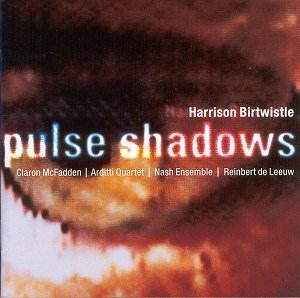It is just possible that anyone who has struggled with
Birtwistleís music in the past could be won over by this extraordinary
work and recording. On the face of it is an unlikely coupling. Paul
Celanís mysterious, emotionally charged imagery does not seem an immediate
match for Birtwistleís uncompromising, stark and direct musical utterances.
Yet what results is a work that gets right inside the very atmosphere
of Celanís world in a truly haunting and affecting way.
As Stephen Pruslin explains in his booklet note it
started "almost by accident". Birtwistle happened to come
across Michael Hamburgerís English translation of Celanís White and
Light one day in a magazine and decided to use it in a song setting.
Shortly after, in 1991, two other poems, Night and Tenebrae,
were set and the same year Birtwistle produced a brief Movement for
String Quartet. Quickly adding two further quartet movements the
composer suddenly found that he had two mini-cycles of three songs and
three quartet pieces on his hands and thus the idea was born to create
a multiplying cycle that would ultimately develop into the eighteen
movements of Pulse Shadows.
Of the movements for quartet, Birtwistle creates a
set of four "Friezes" and five "Fantasias",
the Fantasias evoking resonances of early English viol music
and exploring the material set down in the Friezes in freer form.
The songs are interspersed between, the exception being Todesfuge,
Celanís Deathfugue, where Birtwistle uses Frieze 4 and
the string quartet to provide an instrumental commentary on the words
of the poem. The composer himself has referred to the quartet pieces
as "the songs that could not be written", instrumental responses
to Celanís holocaust inspired poetry that Birtwistle felt to be too
personal to be set, in a literal sense, to music.
Although Birtwistle intended that any of the songs
or quartet pieces could stand alone as works in their own right, he
has succeeded in creating an extraordinary sense of unity, due largely
to the close relationships that exist between the "Frieze"
and "Fantasia" elements of the quartet pieces, these
serving to bind the work together. That said I would strongly recommend
that after first listening to the disc, the various "movements"
are listened to again, both in terms of the quartet pieces separate
to the songs and even breaking down the quartet pieces further to listen
to the Fantasias and Friezes as individual sets. Certainly
for this listener, this was a process that paid considerable dividends
when going back to the work in the order set down on the disc. It is
a difficult and possibly unjustifiable task to select "highlights"
from a work of this consistency, but I would single out Fantasias
3 and 4 for their very personal response to the aforementioned
textural resonances of string music of an earlier age, the setting of
Todtnauberg for its sheer impact in the way Birtwistle brings
the poem into focus by combining the song setting with the spoken word
and Todesfuge-Frieze 4, for the marvellous imagination involved
in what amounts to a strikingly individual, contemporary response to
the art of fugue.
With artists of the quality of the Arditti Quartet
and the Nash Ensemble, the performances are consistently excellent both
in the songs and quartet pieces. Claron McFadden delivers the vocal
lines with fine articulation and never sounds uneasy, despite the considerable
demands of Birtwistleís writing. The recording too is beyond reproach,
crystal clear and balanced to perfection.
And so I come back to my opening comment. I know a
good number of people who have always maintained that they will never
"conquer" Birtwistleís music. Yet Pulse Shadows has
a deeply rich vein of melody, lyricism and above all, emotion, at its
heart. Easy listening then? Of course not. Birtwistle will always challenge,
provoke, question and even intimidate the very fundamentals of musical
art. I would simply maintain that in this highly personal response to
Celanís equally personal poetry, Birtwistle has created a work of atmospheric
beauty and imagery. I can think of relatively few composers who could
match it for the sheer intensity of its expression.
Christopher Thomas.


